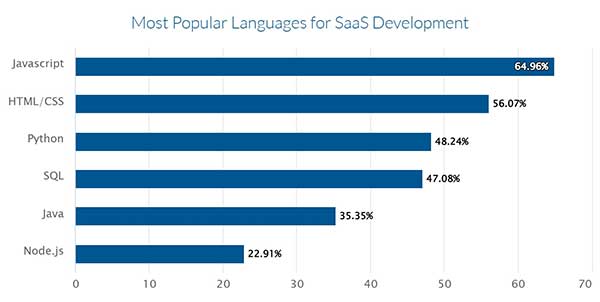Table of Contents
As the Software-as-a-Service (SaaS) industry grows and becomes more and more competitive, businesses are faced with the critical decision of selecting the most suitable programming language for their product development needs.
Java is one of the top choices among the several options available. A staggering 35.35% usage rate cements Java’s position as one of the most widely adopted programming languages for SaaS development.

But what makes Java such a compelling choice for SaaS application development? Why does it continue to captivate developers and businesses alike?
This blog post explores its remarkable characteristics and features that make it an exceptional contender for building robust and scalable SaaS applications. From its platform independence and extensive libraries to its proven performance and vast community support, Java offers a powerful toolkit that fuels innovation and drives success in the SaaS domain. So, let’s unravel why Java stands tall as a reliable and versatile programming language for SaaS application development.
Advantages of Java for SaaS Application development:
With its unique features and capabilities, Java offers several advantages for developing SaaS applications.
Platform independence and scalability:
One of the most significant advantages of Java is its platform independence. This cross-platform compatibility allows SaaS founders to cater to a wider user base and ensures that their applications are accessible to users regardless of their devices. Additionally, Java’s scalability features enable SaaS applications to handle increasing workloads and accommodate growing user bases efficiently.
Robustness and reliability:
Java’s strict compile-time checking and runtime exception handling makes it reliable for developing enterprise-level applications, including SaaS. This is essential for SaaS founders as software glitches and downtime can result in dissatisfied customers and loss of business.
Vast ecosystem and community support:
Java boasts a vast ecosystem of libraries, frameworks, and tools, significantly simplifying SaaS application development. With many open-source libraries and frameworks, Java developers can leverage existing code to expedite development processes and enhance functionality. Moreover, the extensive community support ensures developers can seek help, share knowledge, and effectively address challenges. This collaborative ecosystem reduces development time and fosters innovation in SaaS application development.
Challenges of Java for SaaS Application Development:
While Java offers numerous advantages, it also presents some challenges that SaaS founders must consider.
Memory consumption and performance:
Java’s automatic memory management system, known as garbage collection, simplifies memory management for developers. However, this convenience comes at the cost of increased memory consumption and occasional performance issues. In resource-intensive SaaS applications, excessive memory usage can cause slower response times and decreased overall performance. SaaS founders must carefully optimize their Java code and implement effective memory management techniques to mitigate these challenges.
Steep learning curve:
Java is a powerful and feature-rich programming language but has a steep learning curve, especially for beginners. Learning Java requires a solid understanding of object-oriented programming concepts and familiarity with its syntax and libraries. SaaS founders who aim to develop applications using Java may need to invest time and resources in training their development teams or engage a proven Java application development company. Overcoming this challenge ensures a skilled workforce capable of leveraging Java’s potential effectively.
Constant updates and backward compatibility:
Java’s active development community regularly introduces updates, improvements, and new features to the language. While these updates enhance Java’s capabilities, they can also create challenges related to backward compatibility. SaaS founders must ensure that their Java-based SaaS applications remain compatible with the latest Java versions to leverage new features and security enhancements. This necessitates proactive monitoring and updating of the application’s codebase to avoid compatibility issues.
Mitigation strategies for Java challenges in SaaS Application development:
To address the challenges associated with Java development for SaaS applications, SaaS founders can employ the following strategies:
Effective memory management techniques:
Implementing efficient memory management techniques, such as object pooling, caching, and optimized data structures, can help SaaS founders mitigate Java’s memory consumption challenges, reducing memory overhead and improving application performance for smooth and responsive user experiences.
Comprehensive training and skill development:
To overcome the steep learning curve of Java, SaaS founders should invest in comprehensive training and skill development programs for their development teams. Resources, tutorials, and mentoring opportunities can help developers quickly acquire the necessary Java expertise, enabling them to build high-quality SaaS applications efficiently.
Staying updated with Java advancements:
Given Java’s dynamic nature, SaaS founders must stay updated with the latest advancements in the language. Regularly monitoring Java development trends, attending conferences, and engaging with the Java community ensures that SaaS founders can make informed decisions regarding new features, updates, and best practices. This proactive approach enables them to stay ahead of the curve and leverage Java’s evolving capabilities.
Conclusion
In conclusion, Java presents numerous advantages for SaaS application development. Its platform independence, robustness, and extensive ecosystem make it suitable to address the biggest challenges SaaS founders face when looking to build scalable and reliable applications. However, challenges such as memory consumption and the learning curve should be carefully addressed through effective memory management techniques and comprehensive training. By staying updated with Java advancements and leveraging its strengths, SaaS founders can harness its full potential. When embarking on SaaS application development, partnering with a notable Java Development company can further enhance the chances of success and ensure high-quality deliverables.















